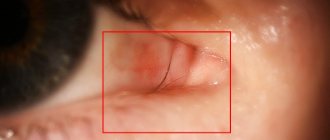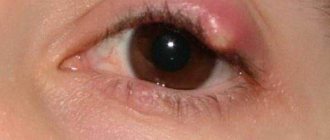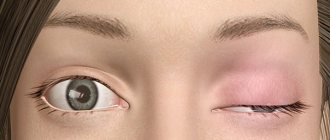When do you need diuretics for swelling of the face?
The most common edema occurs due to errors in nutrition. When a person abuses food with a lot of salt, significant fluid retention occurs in the tissues.
The next morning, characteristic signs of swelling can be found on the face. This type of edema goes away gradually over the course of the day; strong diuretics are not required unless the person has a problem with kidney function.
Edema due to internal organs is conventionally divided into two groups:
- renal - arise due to problems with the kidneys, the face in this case swells first, it acquires a characteristic puffiness, these problems are especially noticeable in the morning, by the evening the swelling gradually disappears;
- cardiac - occurs due to heart failure, swelling first occurs in the lower extremities, intensifies in the evening, and can gradually spread to other parts of the body.
In case of serious pathologies, edema occurs not only in the subcutaneous tissue, but also in large muscles and body cavities.
Experts identify the following causes of edema:
- disturbances in lymph flow, slowdown and stagnation;
- increased permeability of vascular walls;
- high blood pressure;
- hormonal imbalance;
- failure of cardiac function;
- kidney and urinary tract diseases;
- Liver pathologies are rare cases.
Types of diuretics
Diuretics for facial swelling - tablets or other forms of release - can be divided into several groups. Depending on the main substance, the way to create a diuretic effect will differ.
Loop
These drugs affect the filtration process that takes place in the kidney. Loop diuretics help filter salt and remove it from the body. The main element that retains fluid in the body comes out, and the amount of fluid decreases.
They are the most potent diuretics, fluid is removed sharply and in significant quantities, and useful microelements are also removed. The effect occurs 1.5 hours after taking the medicine. Due to side effects, loop diuretics are prescribed only in extreme cases, when there is an urgent need to get rid of excess fluid in the body, for example, during a hypertensive crisis.
Representatives of this group:
- Bumetanide;
- Furosemide;
- Ethacrynic acid.
Sulfonamide diuretics
They are a subgroup of loop diuretics. Drugs containing sulfonamide substances penetrate the kidneys in two ways - through glomerular filtration and tubular secretion.
Representatives:
- Torasemide;
- Furosemide.
Thiazide
Compared to loop drugs, they have less potency in removing fluid and salt. More often they are prescribed not to eliminate edema, but to combat high blood pressure.
Group representatives:
- Benzthiazide;
- Indapamide;
- Klopamide;
- Dichlorothiazide.
Potassium-sparing
These drugs do not provoke increased excretion of potassium from the body. Preserving this trace element is of great importance, as it is very important for the normal functioning of the heart. They enhance salt excretion compared to other drugs, but are considered a drug with a reduced diuretic effect.
If it is necessary to remove a significant part of the fluid, then combined use with other diuretics is recommended.
Group drugs:
- Amiloride;
- Triamterene;
- Spironolactone.
Carbonic anhydrase inhibitors
This group of drugs is not prescribed as an independent diuretic. Used for the treatment of hypertension and glaucoma. The main representative of the group is acetazolamide.
Herbal remedies
Herbal medicines have a mild effect. Compared to chemicals, they do not provoke a sudden loss of large volumes of water and microelements. Due to their natural origin, they can be used by women while expecting a child and by children from an early age.
When using them, there will be no sharp diuretic effect, which means a person can continue to live their normal life without changing plans. The most important herbal diuretic is Canephron.
You can also find herbal teas and infusions in the pharmacy:
- Phytonephrol;
- Brusniver;
- Diuretic fees No. 1, No. 2, No. 3;
- Fitomax.
How to choose medications?
Diuretics for facial swelling (tablets or drops) should be purchased according to the cause of the problem.
Here are some tips to help you choose the right product:
- if a strong and quick effect is important, then you should choose Furosemide;
- if Furosemide does not give the desired effect, you should try Bumetanide, it is 2 times stronger than the first drug, but its undesirable effects are also more significant;
- if a person is thinking about the balance of potassium in the body, and there is no need for a significant increase in diuresis, then it is worth stopping at the drug Triamterene;
- in case of extensive swelling and the need for a quick effect, specialists use a representative of the osmotic group - Mannitol;
- to prevent hypertensive attacks, when a diuretic effect is not fundamentally necessary, drugs of weak and moderate effect are used - Indapamide and Torsemide;
- if there is a great need to maintain potassium levels at the required level, Amiloride is prescribed.
When diuretics won't help
There is no need to think that diuretic tablets or similar folk remedies are a universal remedy for all types of swelling of the hands and face. There are a number of situations when swelling is a secondary symptom, and it is necessary to act on completely different signs and mechanisms.
- Sunburn - tissue swelling develops as a result of prolonged exposure to high air temperature, and is combined with other signs of a burn (redness, local pain, in the worst case - signs of general intoxication). Painkillers and local anti-burn ointments or gels with panthenol are needed.
- Allergic edema (Quincke's edema) is the result of a powerful immediate systemic allergic reaction in response to the entry of an allergen into the body; Significant relief is brought by antihistamines with a rapid onset of effect.
- Local swelling during purulent-inflammatory processes in the dentition or paranasal sinuses, hand joints is associated with reactive tissue swelling and is one of the natural signs of any inflammation.
- Local swelling of the arms (or one arm), which is associated with mechanical compression of the venous vessels due to injury or tumor.
In all these cases, diuretics for swelling of the hands and face will not have any significant positive effect. They are advisable to use for edema of renal or cardiac origin. In the first case, swelling of the facial tissues is typical, in the second - swelling of the arms and legs.
Classification of diuretics
Depending on the method of creating a diuretic effect, drugs have different speed of action, power and methods of creating a diuretic effect.
By speed
The following drugs were recognized as the fastest-acting:
- Bumetanide;
- Furosemide.
By strength of effect
The drugs differ in the strength of their diuretic effect:
| Strength of effect | Group | Drugs |
| Strong | Sulfonamide |
|
| Average | Sulfonamide: thiazide and non-thiazide |
|
| Weak | Sulfonamide | Acetazolamide |
| Nonsulfonamide |
| |
| Steroid |
|
Mechanism of action and composition
Different drug groups of diuretics have their own targets for action.
| Group of drugs | Mechanism of operation | Purpose of influence |
| Sulfonamide | Suppression of sodium, potassium, chlorine transport | Ascending limb of nephron loop |
| Sulfonamide, thiazide and non-thiazide derivatives | Distal tubule of nephron loop | |
| Sulfonamide | Inhibition of carbonic anhydrase | Proximal tubule |
| Non-sulfonamide compounds | Sodium channel blockers in the renal epithelium | The extreme part of the proximal tubule and collecting ducts |
| Steroid | Aldosterone receptor blocker |
The best diuretics of the saluretic group
This group of the most popular diuretic drugs is considered especially effective.
Furosemide
It is a loop group drug. Causes a person to have a powerful but short-term increase in urination. Promotes significant removal of sodium and chlorine. Increased urination is based on the primary action - the removal of salt, and on the secondary action - the direct removal of fluid. At the same time, the excretion of potassium, calcium and magnesium from the body increases.
For hypertension, the drug reduces blood pressure by removing excess fluid and reducing the total blood volume in the body. The diuretic effect is formed 1 hour after taking the medicine, lasts from 3 to 6 hours. After the cessation of action, the volume of sodium excreted does not return to its previous level.
Furosemide is indicated for use in edema of various origins:
- cardiac failure, chronic course;
- renal failure, chronic course;
- nephrotic syndrome;
- liver pathologies;
- hypertension.
The drug should not be taken in the following cases:
- impaired renal function with the presence of anuria;
- failure of liver function, hepatic coma;
- glomerulonephritis in the acute phase;
- disruption of the normal movement of urine through the ureters;
- disturbance of water-electrolytic balance, in the presence of a reduced concentration of minerals;
- the period of waiting for a child and breastfeeding in women;
- children under 3 years of age;
- lactose intolerance;
- wheat allergy;
- increased reaction to the components of the drug.
Bumetanide
A drug from the loop diuretic family. Does not allow sodium ions to be absorbed back into the general bloodstream. Removes potassium, calcium and magnesium from the body. It provokes a retention of uric acid in the body, which can negatively affect health. Bumetanide reduces pressure in the heart cavities and eliminates hypertension.
Increased diuresis begins after 5 minutes. after using the medicine. Significant effect is achieved after 15-35 minutes. The maximum result occurs after 1-1.5 hours. The duration depends on the prescribed dose, and can last from 4 to 6 hours.
Bumetanide is prescribed in the following situations:
- swelling of various nature;
- high blood pressure;
- pulmonary edema;
- cerebral edema;
- cardiac asthma;
- the need to increase diuresis;
- complications during pregnancy - late gestosis, eclampsia.
In the following cases, the use of the drug is prohibited:
- decreased urine production and kidney failure;
- pregnancy in the 1st trimester;
- children under 18 years of age;
- breastfeeding period;
- negative reaction to bumetanide.
Indapamide
Diuretics for facial swelling (thiazide group tablets) are represented by Indapamide. It helps reduce the tone of the smooth muscles of the arteries, resulting in a successful reduction in pressure. Reabsorption of sodium, chlorine and water ions occurs with less activity than with loop drugs.
The therapeutic effect for the treatment of hypertension appears 7 days after the start of the course; the maximum effect is formed after 3 months of continuous use.
The drug is prescribed according to indications:
- increased blood pressure;
- retention of sodium and fluid in body tissues;
- insufficiency of cardiac function, chronic course.
The drug is contraindicated:
- acute situations of impaired blood supply to the brain;
- pathologies of kidney and liver functioning;
- severe stages of diabetes;
- gout;
- intolerance to indapamide.
Torasemide
A loop diuretic that reduces the reabsorption of sodium, chlorine and potassium into the blood. This results in a decrease in osmotic pressure and excess fluid is successfully removed. Torasemide differs from Furosemide in that it removes potassium to a lesser extent.
At the same time, the efficiency of water removal is higher and lasts longer. Torsemide begins to act after 1 hour. The maximum effect is formed after 3-6 hours and lasts from 8 to 10 hours.
Prescribed in the following cases:
- to combat hypertension;
- in the presence of edema of various nature;
- for the treatment of cardiac failure;
- liver and kidney diseases.
Torsemide should not be taken in the following cases:
- scant or complete absence of diuresis;
- deficiency of potassium and sodium in the body;
- dehydration;
- obstructed outflow of urine of any origin;
- glycoside intoxication;
- condition of acute glomerulonephritis;
- children under 18 years of age;
- women waiting for the birth of a child;
- poor tolerance to Torsemide or allergy to the sulfonamide group.
Diuretics in tablets
Facial swelling itself is not a disease, but only a signal of some kind of problem in the body, especially if it occurs every day. Most often, the face swells due to kidney disease, pathologies of the cardiovascular system, disorders of the thyroid gland and diabetes. In this case, you cannot do without diuretics that promote enhanced removal of excess fluid from the body.
There are many groups of diuretic drugs, each of which differs in its mechanism and speed of action, indications and contraindications.
Available in the pharmacy network:
- Aldosterone antagonist drugs. These include Spironolactone (Veroshpiron, Spilactone) and Eplerenone (Dekriz, Inspra, Eridanus, Espiro). They block aldosterone receptors, increase the excretion of sodium, chlorine and water from the body, while slowing down the excretion of potassium and magnesium.
- Thiazide and thiazide-like diuretics. These include Hydrochlorothiazide (Hydrosaluretil, Hypothiazide), Clopamide (Brinaldix), Indapamide (Arifon, Vasopamide). They enhance the excretion of sodium and potassium ions from the body, due to which excess fluid is eliminated faster.
- Loop diuretics. These drugs relax vascular smooth muscle, which occurs by increasing the production of prostaglandins E2 and I2. Due to this, renal blood flow increases and glomerular filtration increases, and the excretion of fluid, potassium and sodium increases. This drug group includes Furosemide (Lasix), Torasemide (Trifas), Ethacrynic acid (Uregid). These drugs are characterized by rapid action and a pronounced diuretic effect, but they also have a significant number of side effects.
- Carbonic anhydrase inhibitors. Mild diuretics that act by influencing enzyme processes in the kidneys, which leads to increased urine secretion. The most commonly used drug in this group is Diacarb.
It is important to remember that diuretics are far from harmless drugs and cannot be used independently, especially on an ongoing basis. Diuretics only eliminate the symptom and do not in any way affect the cause that led to the appearance of swelling.
If you experience frequent swelling of the face and persistent bags under the eyes, you should consult a doctor for a comprehensive examination and treatment, rather than prescribing therapy and taking medications yourself.
The best diuretics of the group of potassium-sparing diuretics
Diuretics that preserve potassium levels in the body are indicated not only for swelling of the face, but also of other parts of the body; these tablets also prevent the release of important microelements.
Triamterene
A diuretic that has the effect of preserving potassium levels. At the same time, the removal of sodium ions is ensured at a sufficiently high level. Can be used in conjunction with thiazide diuretics, thus the diuretic effect is at a high level, while the potassium balance is not affected. The action is formed in 15-20 minutes. after taking the drug, the maximum is achieved after 2-3 hours.
The drug is effective for 12 hours.
Prescribed in the following cases:
- swelling that occurs for any reason;
- deficiency of cardiac activity;
- nephrotic syndrome condition;
- cirrhosis of the liver;
- high blood pressure;
- prevention of potassium deficiency when taking diuretics.
Do not take in the following situations:
- poor liver or kidney function;
- feeding period;
- difficult tolerability of the drug components.
Amiloride
The diuretic effect of the drug is combined with the preservation of potassium levels, while sodium and chlorine are successfully removed. Compared to drugs of the thiazide group, it has a less pronounced diuretic effect. It is recommended to use with drugs without potassium preservation function. This will ensure the desired diuretic effect and preservation of important elements - potassium and magnesium.
Amiloride is recommended for use for the following problems:
- edema of any origin;
- arterial hypertension;
- chronic cardiac deficiency;
- nephrotic syndrome;
- severe liver damage.
The drug should not be taken in the following cases:
- severe functional renal impairment;
- hepatic coma;
- intolerance to components in the composition.
Folk remedies
Sometimes medications made from natural ingredients that have a moderate or mild diuretic effect help with swelling of the face. However, any traditional medicine methods should be used only after consultation with your doctor.
For edema, herbal remedies in the form of decoctions and infusions are usually used. Medicinal plants with diuretic effects include:
- lingonberry leaves;
- chamomile;
- bearberry;
- parsley and dill seeds;
- birch leaves and buds;
- juniper fruits;
- thyme;
- calendula;
- horsetail;
- bearberry;
- coltsfoot;
- valerian;
- motherwort;
- oregano;
- Melissa;
- Linden;
- St. John's wort;
- mint;
- nettle;
- linen;
- barberry;
- shepherd's purse;
- chicory.
Ready-made diuretics (kidney tea, etc.) to eliminate edema can be purchased at the pharmacy. You can also prepare remedies based on medicinal plants at home. To eliminate facial swelling, you can use the following recipes:
- Infusion of horsetail . 4 teaspoons of dry herb are poured into 500 ml of boiling water, left for 20 minutes and filtered. The finished infusion is taken 3 tablespoons 4 times a day.
- Infusion of shepherd's purse . 1 tablespoon of dry raw material is poured with 1 glass of boiling water, left for 10 minutes, filtered and consumed 3 times a day before meals.
- Infusion of parsley seeds . Parsley seeds (0.5 teaspoon) are poured into a glass of drinking water, infused for 7-9 hours and taken 2-3 tablespoons every 2 hours during the day.
- Juice from celery greens . Take 1 teaspoon of celery juice 3 times a day 30 minutes before meals.
The best diuretics of the osmotic diuretic group
Diuretic drugs of the osmotic group best cope with the task of removing excess water. In large dosages, they provoke increased excretion of electrolytes - sodium and potassium. The main representative of osmotic diuretics is Mannitol. It is a hexahydric alcohol. The drug causes a diuretic effect, reduces the hypertonicity of the renal medulla.
Mannitol is indicated in the following cases:
- prevention of acute renal failure, especially in people at risk - surgical interventions on the heart and blood vessels;
- prescribed for swelling and when it is necessary to get rid of excess water;
- Mannitol is prescribed in diagnostic studies when it is necessary to evaluate diuresis.
The diuretic has the following properties:
- release of nephrotoxic substances and their removal from the body;
- prevents the formation of agglutinates - the accumulation of crystals of salts, such as oxalates, urates, phosphates;
- prevents the formation of obstruction of the renal tubules;
- maintains the balance of renal blood flow;
- reduces swelling and enlargement of cells, thus maintaining normal cellular architecture.
It is available in the form of ampoules for intravenous administration, so it begins to act very quickly. It is eliminated from the body slowly.
The basis of the work of osmotic diuretics is to increase the osmotic pressure in the blood plasma due to the movement of fluid from body tissues into the bloodstream. This is how the diuretic effect is formed. This type of diuretic preserves potassium, and the balance of other electrolytes.
What diuretics are there?
A modern pharmacy provides its potential buyer with a great variety of capsules and tablets, and folk recipes are no less varied. The mechanism of action has certain differences, but in general it has an effect on all tissues of the body in terms of increasing the excretion of fluid (which is what is needed for swelling of the hands and face), on the kidney tissue, where the reabsorption of sodium and water ions is reduced, and accordingly, more urine is released.
Any diuretic drugs to eliminate edema must be not only effective, but also safe. It is advisable to entrust their choice to a doctor or pharmacist at a pharmacy, and not be guided by a television advertisement watched the day before. Most diuretics are tablets that you can easily take without attracting too much attention from others, and discreetly carry with you when necessary.
New generation tablets. Rating of the best drugs and their cost
Diuretics for facial swelling - tablets based on classic drugs, but with an improved composition. Often, new generation drugs are more “purified” and there are fewer side effects when using them.
Britomar
Cost – 350 rub. for 30 tablets. The main substance is Torasemide, which, as a representative of the saluretic group, inhibits the return of sodium and chlorine into the blood. Britomar is known for working when other diuretics have failed.
The effect of increasing diuresis is formed after 2-3 hours and lasts for 12 hours. The desired effect in the treatment of problems with the heart and blood vessels is formed during the first week of use.
Indicated for use for the following problems:
- a significant degree of renal dysfunction; in mild cases it is worth using other drugs that are not as strong as Britomar;
- use of hemodialysis;
- swelling, effusion of internal organs;
- deficiency of cardiac activity;
- pathology of myocardial functioning;
- decrease in blood pressure;
- reducing the increased excitability of the walls of blood vessels.
Britomar should not be used in the following cases:
- individual tolerability of Torasemide;
- hypotension;
- decreased sodium and potassium levels;
- breastfeeding period;
- urinary disorders and lack of diuresis.
Spironolactone
Cost – 75 rubles. for 20 tablets. A potassium-sparing diuretic that works on the basis of an antagonist of corticosteroid hormones, which help return water and sodium ions to the bloodstream and remove potassium. Thus, active removal of fluid and substances that retain it occurs, and the potassium balance is maintained.
The diuretic result is formed 3-5 days from the start of using Spironolactone. The decrease in pressure after the drug starts working is not permanent and requires correction with other drugs.
Prescribed in the following cases:
- swelling of any origin;
- hypertension;
- acute deficiency of function and severe liver damage;
- nephrotic syndrome;
- with low levels of potassium and magnesium.
Contraindications for use:
- negative reaction to the use of the drug;
- acute renal deficiency;
- disturbance and absence of diuresis;
- for women during pregnancy and breastfeeding;
- increased levels of potassium in the bloodstream and taking additional potassium supplements.
Triampur Compositum
Cost – 320 rubles. for 50 tablets.
It has a diuretic effect due to 2 mechanisms:
- prevents the return of sodium and chlorine to the bloodstream;
- organization of the osmotic effect - migration of fluid from cells into the bloodstream with subsequent excretion by the kidneys.
Long-term use of Triampur provokes potassium loss. The product begins to work 1.5-2 hours after use. Lasts from 10 to 12 hours. The hypotensive effect lasts longer - up to a day.
Triampur is prescribed in the following cases:
- for edema of any origin;
- diseases and deficits of heart function;
- liver and kidney pathologies;
- the need to get rid of excess water combined with the need to maintain a balanced potassium level.
The drug should not be taken in the following cases:
- hypersensitivity to sulfonamides and drug components;
- for women while expecting a child and breastfeeding;
- kidney function deficiency;
- insufficient diuresis;
- acute inflammatory processes of the kidneys and liver;
- electrolyte imbalance – very low or elevated levels of potassium and calcium;
- urolithiasis and gout;
- diabetes;
- folic acid deficiency.
Products for relieving swelling from different parts of the body, for example, from the face or limbs, should not be taken without first consulting a specialist. Diuretic tablets can have a negative effect on the body and have contraindications; if used incorrectly, a person’s condition can worsen.
Long-term use of diuretics can provoke an addictive effect. Each drug has its own purpose and effects. Before taking it, you should carefully select the product, taking into account the desired effect and the person’s health condition.
Side effects and contraindications
It must be said that forced removal of fluid from the body is sometimes fraught with negative consequences. This method of getting rid of stagnation helps to eliminate not only water, but also various mineral elements. Most often, under the influence of diuretics, potassium, calcium, sodium, chlorine and magnesium are excreted.
For this reason, diuretics should be taken carefully, even as a herbal remedy for edema, following the recommended dosages and duration of use.
Particular care should be taken when using diuretic herbs:
- with an allergic reaction to herbs;
- when treating a child under 6 years of age;
- for kidney or bladder stones;
- with prostate adenoma.
Diuretics are used for diseases of the liver, kidneys and heart, but in this case the content of a number of elements should be monitored. This is especially true for potassium.











